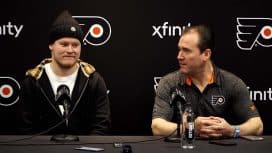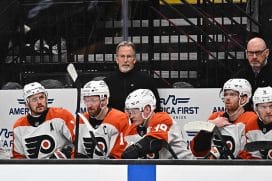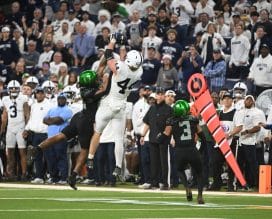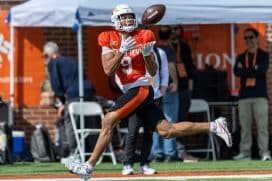Uncategorized
Analyzing the series: What the Flyers and Rangers will bring in the playoffs
The NHL was looking for bitter rivals to meet up in the postseason when they introduced their new playoff format last summer, and that's exactly what they received with this series between the Philadelphia Flyers and the New York Rangers. The Flyers may be in trouble with their visits to Madison Square Garden and facing Henrik Lundqvist with their playoff chances on the line, but there's a reason why they play the games. Here's a deeper look at the teams in this playoff series.
SEASON SERIES
Despite all the commotion over the Flyers not winning at MSG since the 2010-2011 campaign, the Orange and Black were able to win both of their homes games in this series to go 2-2-0 against the Blueshirts in the 2013-2014 regular season.
The Flyers grabbed a 2-1 win over New York way back in October to increase their record to 2-7-0. Considering they had a week off and faced Cam Talbot, it wasn't the most convincing win over the Rangers, as they were 2-5-0 entering the tilt. Matt Read had a shorthanded goal and a helper on Braydon Coburn's game-winning goal in the third period, as the Rangers nearly tied it up late in the tilt, but their game-tying tally was disallowed. Steve Mason stopped 30 shots in the win, as the Rangers had 55 five-on-five shot attempts to the Flyers' 33.
The second meeting between the two clubs came on January 12th, as the Flyers dropped a 4-1 decision to the Rangers in New York. The Orange and Black were in the midst of a 2-5-2 slide in late January when Ray Emery saw three shots beat him just 9:24 into the game. The Rangers dictated play early and dominated the second period, as New York finished with 69 shots attempts to the Flyers' 59.
The clubs met for a third time shortly after the Olympic break, as the Flyers won a 4-2 contest at the Wells Fargo Center on March 1st. Wayne Simmonds had a goal and an assist, while Kimmo Timonen had two assists in the lone meeting between these clubs all season where the Flyers dictated play. The Flyers' win also started a three-game losing streak for the Rangers.
In the teams' final game of the year, the Flyers lost 3-1 at Madison Square Garden on March 26th. With the exception of a Jakub Voracek goal with just 1:53 left in regulation, Lundqvist shut down the few Flyers' chances in the tilt, as both Derek Dorsett and Dominic Moore beat Mason in the loss. Despite outshooting the Rangers 15-6 in the opening frame, the Flyers found themselves down by one before New York outshot them 17-10 in the middle period to help them enter the third down 2-0.
GOALTENDING
Based on career statistics and playoff experience, the New York Rangers have the edge in net with Henrik Lundqvist. New York's number one option in net, Lundqvist has played in 67 playoff games over his career posting a .920 save percentage with eight shutouts. Along with nearly 70 postseason games in his career, Lundqvist has taken part in each of the last seven postseasons.
As for Mason, his only experience in the postseason was when he was the netminder for the Columbus Blue Jackets and the club was swept in the opening round of the 2009 postseason by the Detroit Red Wings. Mason hasn't had a chance to return to the postseason in any of the last five seasons, so you don't know what to expect out of the goaltender in this series.
This season, the goalies were 1-1-0 against each other, as Mason beat Lundqvist at the Wells Fargo Center in early March and Lundqvist beat Mason at MSG later in the month. Each goaltender did take part in three games of the season series, as both netminders played a huge role in their two wins. Lundqvist will most likely stand on his head and Mason will need to match it, or at least be close to it, to give the Flyers a chance in the series. Seeing how sporadic Mason was throughout this season paired with his lack of postseason experience, no one is really certain of what to expect out of Mason in this series. In fact, his play might be the biggest question mark entering the series.
MATCHING LINES
The biggest matchup to watch this series will be Sean Couturier and Matt Read going up against New York's top line of Rick Nash, Derek Stepan, and Martin St. Louis. It's not definite who will be on the third line with Couturier and Read, but whether it is Michael Raffl or Tye McGinn, this will be the most important matchup in the series. We've seen Couturier's ability to shut down the opposition's elite center while Read helps to forecheck and pressure the puck at the same time. As it sounds like Steve Downie is out for at least the first game, it is important for McGinn or Raffl to step up and play well defensively to effectively take out three of the Rangers' top three offensive players.
As for the Flyers' top line of Scott Hartnell, Claude Giroux, and Jakub Voracek, Alain Vigneault will most likely turn to his second line of Benoit Pouliot, Derick Brassard, and Mats Zuccarello. This line will need to produce for the Orange and Black, as it doesn't seem likely the third line will have time to score on top of attempting to shut down the Rangers' top line and the second line isn't the best at pushing play at five-on-five. Not only did the Flyers' three forwards on this line gain 200 points to the Rangers' line total of 140, the trio for Philadelphia should be able to hold their own, if not dictate play, against New York's second line.
What could be the scariest matchup of all four for the Flyers will be Philly's second line of Brayden Schenn and Wayne Simmonds against New York's third line of Carl Hagelin, Brad Richards, and Jesper Fast. As stated earlier, it's uncertain if Raffl or McGinn will be on the line with Schenn and Simmonds, but if Craig Berube decides to put McGinn on the line, the Flyers could be chasing play the entire series with this matchup. It could be a huge blow to the series if Simmonds is limited in terms of scoring, considering he led the team with 29 goals this season. Another huge wild card to the series, along with Mason's play, is the play of Schenn. In a line matchup that doesn't seem to be favorable for Philadelphia, if Schenn can help limit Richards and company or even their output, the Flyers could have a decent chance at winning the series.
Another interesting matchup to watch, that could favor the Flyers, is the matchup of fourth lines where Vincent Lecavalier, Adam Hall, and Zac Rinaldo will go up against Brian Boyle, Dominic Moore, and Daniel Carcillo or Derek Dorsett. With how well Lecavalier has been playing with Hall, the two former members of the Tampa Bay Lightning can help provide a crucial goal or two that the Orange and Black may need this series. The battle of fourth lines obviously won't produce several goals, but depth is key in the playoffs, especially in a series that will be close and difficult.
DEFENSIVE PAIRINGS
Another aspect of this series that makes it difficult for the Flyers is the defensive depth of the Rangers. Once you get past the top pairing of Ryan McDonagh and Dan Girardi, Marc Staal and Anton Stralman are waiting as the second pair. It is noted how well Staal has been over the years, but Stralman is having a very respectable season, as he leads a very strong puck possession team in Corsi for percentage with 56.5 percent. John Moore and Kevin Klein round out a rather impressive defensive unit for the Blueshirts.
For Philadelphia, it's obvious that Braydon Coburn and Kimmo Timonen will have to have a strong series to be successful. A few interesting aspects for Philly's defense will be the play of Andrew MacDonald and Hal Gill. As it has been for most of his time with the Flyers, MacDonald will be watched with a close eye this playoff series, as the advanced statistics crowd and the "eye-test" crowd continue to differ on how impactful the former New York Islander is on Philly's blue line. Although strong in his own end in terms of getting the puck out of the d-zone, MacDonald also seems to allow the opposition to enter the offensive zone with ease compared to other Flyers' defenders. As for Gill, it looks as though he will see some playing time for the Flyers in the postseason after only taking part in six games during the regular season. Gill may be able to provide a better shutdown role than Nicklas Grossmann. With an additional three inches and 13 pounds, Gill can most likely do a better job of clearing the crease while bringing the ability to get under the opposition's skin. It isn't certain if Gill will play several games this series, but it is something to keep an eye on.
SPECIAL TEAMS
It's no secret the Flyers' special teams are key to their success, but how will they do against the Rangers? New York's power play finished 15th in the NHL converting on 18.2 percent, while the Orange and Black's penalty kill denied 84.8 of the opposition's power-play opportunities to finish seventh in the NHL.
The more interesting special teams' matchup to watch will be the Flyers' power play against the Rangers' penalty kill. Philly finished eighth in the NHL with a 19.7 conversion rate with the man advantage, while New York finished third in the NHL with a penalty kill that was successful 85.3 percent of the time.
Despite the difference in where each unit finished in the rankings, both the Flyers and the Rangers had two power-play goals this season, as the Flyers had 13 power-play opportunities to New York's 12 chances. With the advantage the Rangers have at five-on-five, the Flyers ability to convert on the power play could play a huge role in the series. Obviously there will be less calls in the playoffs than in the regular season, but that is exactly why as many or more power-play goals than they produced during the regular season series can help the Flyers greatly. As for the penalty kill, a goal yielded shorthanded would hurt the Flyers more than the Rangers. As mentioned before, New York will have the advantage at even strength, so giving New York a few power-play goals in the series will only lessen Philly's chances of escaping the first round.
CONCLUSION
The Rangers will most likely dictate play at five-on-five, as the Flyers will need to find a way to beat Lundqvist once they find a way past New York's three effective defensive pairings. We aren't sure what we will see out of Mason, whether that means he is going to stand on his head or let the pressure get to him in what could be the fifth through 11th playoff games in his career. Philly will need Couturier's line to shut down New York's top line, along with Giroux's line taking advantage of the Rangers' second line. Philly's second line may struggle against New York's third line, but Lecavalier should be able to dictate play with Philly's fourth line against New York's fourth line. If the Flyers can hang with the Rangers at even strength, a timely power-play goal, or even shorthanded goal, could very well be the difference in a game or the series.





